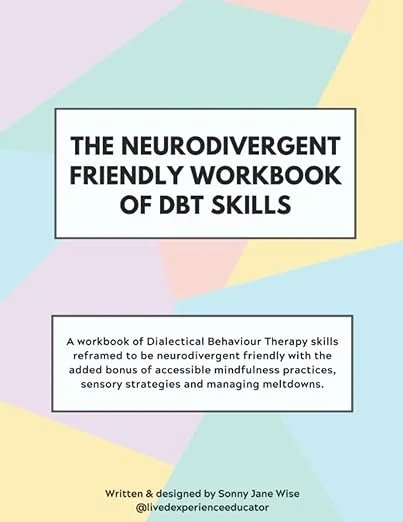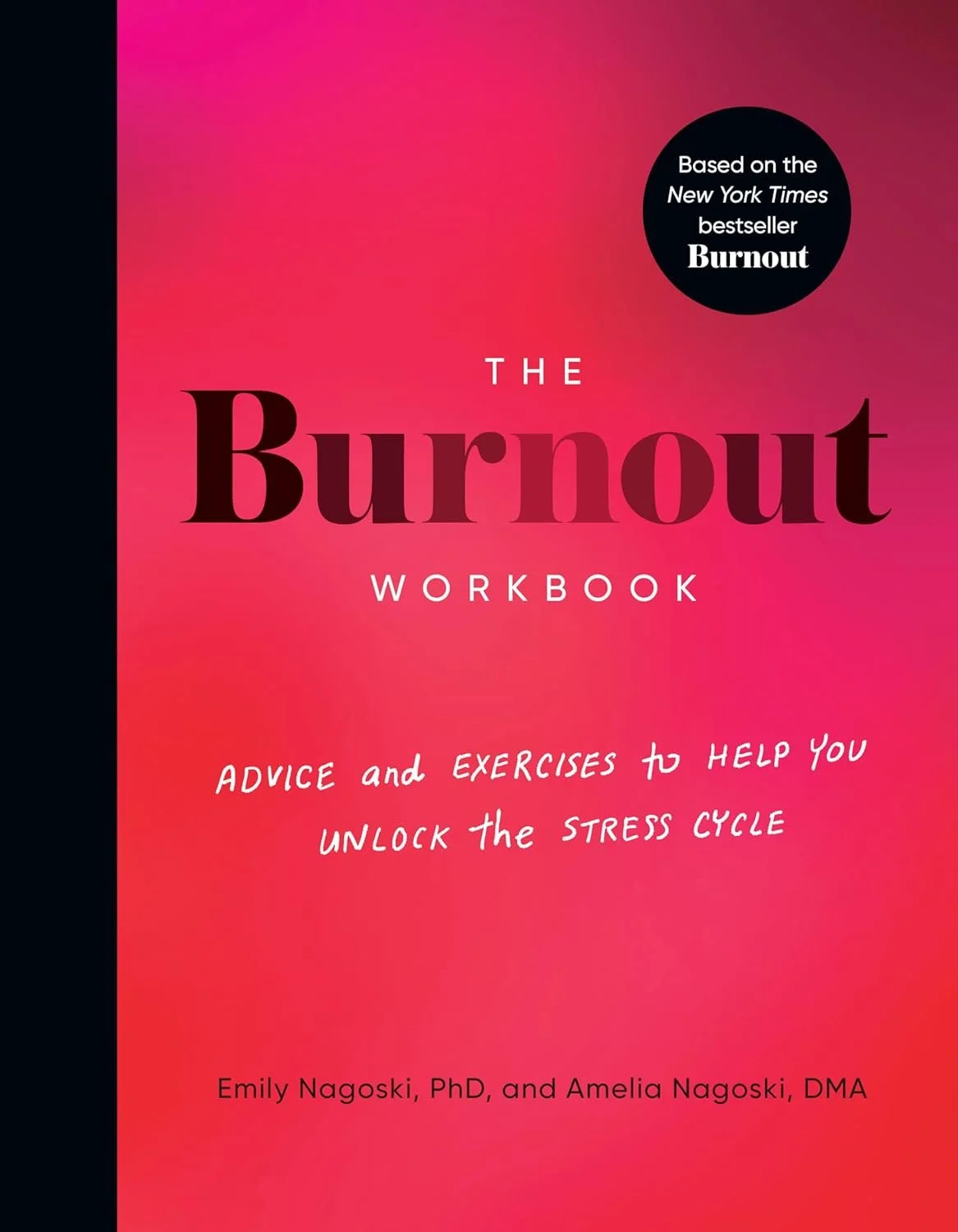5 Workbooks I Recommend All the Time as a Therapist (and Why They Actually Help)
There are so many mental health workbooks out there—it can be overwhelming. You might see them promoted on social media or popping up while browsing Amazon for a mental health book. But you may be wondering: Are these actually helpful? Are the strategies backed by real therapeutic approaches?
As a mental health counselor, I often recommend specific workbooks to support my patients between sessions. In this post, I’ll share the five workbooks I currently recommend most often in my counseling practice—and why I think they’re genuinely worth your time.
Why I Use Workbooks in Therapy
Workbooks can be incredibly helpful for patients who have a hard time applying what they learn in therapy to everyday life. They offer structure, reinforce key concepts, and provide a visual reference between sessions. For some people, they also help kick-start a consistent journaling habit—which can deepen self-reflection and support emotional growth.
Because I provide virtual therapy sessions, I sometimes use workbooks during sessions as a tangible, visual tool. They can be especially useful for patients who are new to therapy, prefer more structure, or want to do additional self-guided work between sessions.
Whether you’re working on anxiety, burnout, or self-esteem, the right workbook can be a great complement to counseling services and help you get more out of your mental health journey.
Library, Thrift, or Local? Affordable Ways to Find These Workbooks
While Amazon is often the most convenient option, there are budget-friendly ways to access these mental health workbooks. Books can be expensive, and the last thing I want is for mental health support to feel out of reach. If you're looking for more affordable resources, here are a few options that might help.
Your Local Library
You might be surprised, but I’ve actually found some of these mental health workbooks available for free through local library eBook apps. If you have a library card, most libraries offer access to digital resources through apps like Hoopla and Libby.
In Jackson, Michigan, the public library system provides both of these platforms. With Libby, for example, you can even send eBooks directly to your Kindle. Getting a library card is quick and easy—just one visit to your local branch. If you live or work in Jackson, MI, you’re eligible for a card and can access services at multiple locations across the city.
This is a great way to explore mental health workbooks without spending extra—and a helpful option if you're starting therapy and want affordable tools to support your growth.
Online Thrift/Used Book Stores
Several of my patients have told me they’ve found workbooks in great condition through online thrift and used bookstores. This can be an excellent way to get a physical copy at a much lower price—especially if you prefer to write directly in the book.
Two great options to check out are ThriftBooks.com and WorldofBooks.com (formerly known as Second Sale). These sites often carry popular mental health workbooks at discounted prices, making them a budget-friendly option.
Support a Local Independent Bookstore
If you’re looking to support local businesses and shop small, independent bookstores are a wonderful choice. Many of these shops carry thoughtfully curated selections, including mental health and self-help titles—and they often have staff who are happy to help you order specific workbooks.
Here are a few independent bookstores in Michigan that I love or have heard great things about:
Blackstone Bookstore and Cultural Center – Ypsilanti, MI
Hooked – Lansing, MI
Serendipity Books – Chelsea, MI
If you're located in or near Jackson, Michigan, these stores make for a great day trip and are a meaningful way to invest in your community while accessing quality mental health resources.
Workbook #1: The Big Feelings Survival Guide by Alyse Ruriani
The Big Feelings Survival Guide is a beautiful and creative mental health workbook that I often recommend to clients who want to better understand their emotions and express themselves outside of session. It’s a great tool for emotional processing and self-reflection, especially for those who enjoy a more creative approach to healing.
Who it’s for: Adults and teens with emotional overwhelm, trauma history, or a hard time naming feelings.
Why I recommend it: This workbook was created by a Registered Art Therapist and Licensed Professional Counselor, which shows in both its depth and design. It combines engaging art therapy exercises with evidence-based Dialectical Behavior Therapy (DBT) skills—focusing on emotion regulation, distress tolerance, mindfulness, and interpersonal effectiveness.
It’s also conveniently journal-sized, making it easy to carry with you and work on throughout the day. And honestly, it’s a beautiful mental health workbook—Alyse Ruriani did an incredible job blending creativity with therapeutic structure. I often recommend this to patients who benefit from visual tools and creative processing.
How I use it in therapy: I frequently teach many of these DBT skills in sessions, and the art therapy prompts from this workbook are a great way to build on that work. They help clients explore and process emotions they’ve experienced outside of session and bring those insights into our time together.
Website: https://www.alyseruriani.com/
Author IG: @alyseruriani
Workbook #2: The Neurodivergent Friendly Workbook of DBT Skills by Sonny Jane Wise
Although I already recommended an Art Therapy + DBT workbook, I also love recommending The Neurodivergent Friendly Workbook of DBT Skills by Sonny Jane Wise. While many DBT workbooks can feel repetitive, overly clinical, or just plain boring, this one is different—in the best way.
Sonny has created a resource that’s engaging, straightforward, and specifically designed with neurodivergent brains in mind. It’s affirming, accessible, and cuts through the fluff without sacrificing depth.
Who it’s for: People who are neurodivergent who struggle with traditional DBT models.
Why I recommend it: This workbook features a well-organized table of contents, making it easy to jump to specific sections based on what you're currently working on—whether that’s emotional regulation, sensory needs, or coping strategies. It includes relatable examples that show how neurodivergent individuals might experience emotions, DBT skills, and self-regulation in real life.
It also provides excellent psychoeducation in an affirming, accessible way. What makes this workbook even more powerful is that it’s written by someone with lived experience.
How I use it in therapy: I often use this workbook during sessions with patients when we’re exploring concepts like the window of tolerance, emotional regulation, and sensory needs. It’s especially helpful for people who benefit from clear, relatable visuals and practical tools.
Website: https://www.livedexperienceeducator.com/
Author IG: @livedexperienceeducator
Workbook #3: The Burnout Workbook by Emily & Amelia Nagoski
The Burnout Workbook is a supplemental companion to Emily and Amelia Nagoski’s book Burnout: The Secret to Unlocking the Stress Cycle. This workbook primarily focuses on how burnout is experienced by women and offers practical strategies for recognizing, preventing, coping with, and uncovering the root causes of burnout.
Who it’s for: Women who are exhausted, over giving, or stuck in the stress cycle—especially healthcare workers, parents, students.
Why I recommend it: Whether you’re reading it alongside the main book or using it on its own, this workbook is incredibly helpful for reflecting on patterns in your life that contribute to burnout. It also offers validating insights into life circumstances that can create barriers to preventing burnout.
Many clients find it useful as a guided journal with prompts that encourage self-awareness and healing—making it a valuable tool for burnout support.
How I use it in therapy: This workbook features clear visuals and useful exercises, such as The Decision Grid, which helps patients evaluate the pros and cons of continuing or quitting. It also provides valuable psychoeducation, including a chart that explains different ways to complete the stress cycle and when each method works best. I use these tools when focusing on burnout and stress management in sessions with patients to promote lasting self-care and balance.
Website: https://www.burnoutbook.net/
Author IG: @enagoski and @amelianagoski
Workbook #4: Your Body Is Not an Apology Workbook by Sonya Renee Taylor
This workbook is a companion to Sonya Renee Taylor’s original book, Your Body Is Not an Apology. I appreciate this workbook because it offers powerful prompts about how we talk to and about our bodies. It also explores memories and emotions connected to our body image, encouraging deeper self-awareness and radical self-love. It’s an excellent resource for anyone seeking to improve body positivity and self-acceptance.
Who it’s for: This workbook is great for anyone—especially women—who are working on body image, building self-worth, or unlearning internalized shame.
Why I recommend it: I haven’t found many books that explore body image and self-talk as powerfully and gracefully as Sonya Renee Taylor does. This body image workbook includes thoughtful prompts and insightful psychoeducation, making it an excellent tool for journaling and reflection between therapy sessions. It's especially helpful for addressing distorted thinking patterns related to body image.
How I use it in therapy: I often use themes from this workbook in session to help patients explore the narratives they hold about their bodies and where those messages originated. It’s a powerful tool for increasing self-awareness and promoting healing around body image.
Website: https://www.sonyareneetaylor.com/
Author IG: @sonyareneetaylor
Workbook #5: The Ultimate Self-Esteem Workbook for Teens by Megan MacCutcheon
I don’t currently see teens as therapy clients, but this was one of my go-to workbooks when I did. I wanted to include it on this list in case you’re looking to support a teen in your life—or if your teen is on a waitlist for therapy and could use a helpful resource while waiting for an opening. The Ultimate Self-Esteem Workbook for Teens is a powerhouse of psychoeducation, skill-building, and guided reflection around vulnerable topics related to confidence and self-worth.
Who it’s for: Teens struggling with self-worth, comparison, and inner criticism.
Why I recommend it: This workbook offers helpful education about what self-esteem actually is and the many factors that can influence it—including negative thought patterns and lived experiences. It breaks things down in a way that’s easy for teens to understand, while also encouraging meaningful reflection on how their experiences have shaped the way they see themselves.
How I’ve used it in therapy: When I worked with teen clients, I often used exercises from this workbook—especially the sections on noticing negative self-talk. These activities helped teens put words to the distorted thinking patterns they were experiencing. There’s also a great section on perfectionism, which comes up often in teens dealing with anxiety. It’s a helpful tool for building insight and self-compassion.
Website: https://www.meganmaccutcheon.com/
Author IG: @meganmaccutcheonpmhc
How to Choose the Right Workbook for You
Start by identifying what’s coming up for you right now—is it difficulty identifying or coping with emotions? Is it stress, exhaustion, or burnout? Are you struggling with rumination or negative thought patterns about your body? Pinpointing your current challenges can help you choose a workbook that actually supports your needs.
When I’m deciding whether to buy a workbook, I also take a look at the author. Are they a licensed mental health professional? Do they have lived experience related to the topic? What qualifies them to write a workbook on this subject? It’s also helpful to see if the workbook is a companion to a more in-depth book by the same author—it can give you even more insight and context.
Want Guidance as You Work Through One?
I love incorporating workbooks into individualized therapy sessions—whether we use them together during our time or you work through them between sessions and bring your insights and reflections to discuss more deeply. If you’re interested in starting therapy or want support using these workbooks, feel free to reach out to learn more about my counseling services in Jackson, Michigan.
Click here to schedule an appointment or a free 10-minute consultation.








